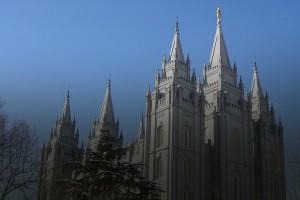 There is an unfortunate legacy of false prophecy related to Joseph Smith, the “prophet” and founder of Mormonism. Just type “False Prophecy of Joseph Smith” into any search engine and you’ll discover what I mean. But there appears to be some confusion surrounding Joseph’s prophesies, and neither Mormons nor non-Mormons seem to examine the claims of prophecy fairly. Non-Mormons point to every prophecy of Joseph in an effort to demonstrate he is a liar, and Mormons try to justify Joseph’s unfulfilled predictions by twisting the laws of prophecy. Let’s take an honest look at the different types of prophesy as they relate to Joseph Smith. Before we begin, we’ll need to examine the different categories of prophecy as they apply to the founder of Mormonism:
There is an unfortunate legacy of false prophecy related to Joseph Smith, the “prophet” and founder of Mormonism. Just type “False Prophecy of Joseph Smith” into any search engine and you’ll discover what I mean. But there appears to be some confusion surrounding Joseph’s prophesies, and neither Mormons nor non-Mormons seem to examine the claims of prophecy fairly. Non-Mormons point to every prophecy of Joseph in an effort to demonstrate he is a liar, and Mormons try to justify Joseph’s unfulfilled predictions by twisting the laws of prophecy. Let’s take an honest look at the different types of prophesy as they relate to Joseph Smith. Before we begin, we’ll need to examine the different categories of prophecy as they apply to the founder of Mormonism:
Open-dated Prophecies
Let’s begin with the easiest predictions a prophet can make. Open-dated prophecies are given without a specific time frame for their fulfillment:
Example: Joseph Smith predicts in 1835 that, “The coming of the Lord, which was nigh – even fifty-six years should wind up the scene” (History of the Church, Vol. 2 p. 182).
Although the Lord did not return by 1891, Joseph Smith only said fifty-six years “should” wind up the scene. The word “should” provides Joseph with an escape clause; it allows for the possibility something could happen to upset the original time schedule. Therefore, even though the prediction did not come true, this prophecy alone does not necessarily make Joseph Smith a false prophet. Christians cannot look at open-dated prophecies and judge the prophetic status of Joseph Smith.
Self-fulfilling Prophecies
These are prophecies the prophet can fulfill on his own. They require no outside action or event outside the control of the prophet.
Example: The Lord instructs Joseph not to translate any more until he goes to Ohio. (D&C 37:1).
To make this prophecy come true, Joseph Smith simply had to stop translating for a few months. When a prophet has the ability to control the outcome of the prophecy, there is no way to judge whether or not the prophet is true or trustworthy. Just as it is unfair for Non-Mormons to try to use open-dated prophecies against Joseph, Mormons cannot use these types of self-fulfilling prophecies to prove Joseph Smith is a prophet of God.
Conditional Prophecies
These types of prophecies only come true if a certain condition exists. In other words, if a situation changes, the prophecy may also change.
Example: Joseph Smith states that if the people of Ohio repent, they will not be severely judged of the Lord (D&C 64:16-18).
The outcome of this prophecy is conditioned upon the repentance of the people in question. If the people of Ohio were not severely judged, it could be fairly argued they must have sufficiently repented. So this type of prophecy cannot be used by either side to prove anything at all.
Most of Joseph Smith’s prophecies are of the first three types, and while these forms of prophecy are often cited by one side or the other to falsify (or verify) the prophetic stature of Joseph Smith, none are legitimately applicable. There is a fourth kind of prophecy, however, uttered by Joseph Smith. This last form of prophecy can be examined to validate (or invalidate) Joseph’s status as a true prophet:
Close-dated and Unconditional Prophecies
Some prophecies are offered with specificity and must come true within a particular time frame without any mitigating conditions. Although relatively few of Joseph Smith’s prophecies are of this type, they are extremely important because they allow us to test Joseph Smith as a prophet.
Example: Temple in Independence.
In this revelation given on September 22 and 23, 1832, Joseph Smith foretold of an LDS temple to be built in Independence, Missouri. (D&C Section 84):
1. “A revelation of Jesus Christ unto his servant Joseph Smith, Jun., and six elders, as they united their hearts and lifted their voices on high.
2. Yea, the word of the Lord concerning his church, established in the last days for the restoration of his people, as he has spoken by the mouth of his prophets, and for the gathering of his saints to stand upon Mount Zion, which shall be the city of New Jerusalem.
3. Which city shall be built, beginning at the temple lot, which is appointed by the finger of the Lord, in the western boundaries of the State of Missouri, and dedicated by the hand of Joseph Smith, Jun., and others with whom the Lord was well pleased.
4. Verily, this is the word of the Lord, and that the city New Jerusalem shall be built by the gathering of the saints, beginning at this place, even the place of the temple, which temple shall be reared in this generation.
5. For verily this generation shall not pass away until an house shall be built unto the Lord, and a cloud shall rest upon it, which cloud shall even the glory of the Lord, which shall fill his house.”
31. …which house shall be built unto the Lord in this generation, upon the ‘consecrated spot as I have appointed.’”
Verses four and five declare a “temple shall be reared in this generation. For verily this generation shall not all pass away” before the temple will be built. And this temple is to be built in Zion, which is Independence, Missouri. Over one hundred and eighty years later, there is still no Temple on the “temple lot” specified in this prophecy. Early Mormon leaders made it quite clear the word “generation” meant those who were alive when the revelation was given in 1832.
25 years later, Heber C. Kimball still believed it
“They are holy places, and they will be held sacred even as Jackson County..” “and I shall yet see the day that I will go back there, with brother Brigham and with thousands and millions of others, and we will go precisely according to the dedication of the Prophet of the living God. Talk to me about my having any dubiety on my mind about these things being fulfilled.—I am just as confident of it as I am that I am called to be a saviour of men, and no power can hinder it.” (President Heber C. Kimball, December 17, 1857 Journal of Discourses, Vol 6. p. 190).
25 years later, Elias Smith still believed it
“I expect to live to be an old man, and to go back with the saints to the land of Jackson County.” (President B. Young; “God grant it.”) (1857 Journal of Discourses, Vol. 6, p. 221)
29 years later, Heber C. Kimball still believed it
“Brethren, I shall go to Jackson County with thousands of this people who will be faithful to their integrity; but we cannot go back until we have built some good houses.” (1861 Journal of Discourses, Vol. 8, p. 350, Disclosure by Heber C. Kimball).
29 years later, Elder George A. Smith still believed it
“Who is there that is prepared for this movement back to the center stake of Zion, and where are the architects amongst us that are qualified to erect this temple and the city that will surround it.” “And let me remind you that it is predicted that this generation shall not pass away till a temple shall be built, and the glory of the Lord rest upon it, according to the promises.” (Elder George A. Smith, March 10, 1861, Journal of Discourse, Vol. 9, p. 71).
32 years later, Elder George Q. Cannon still believed it
The generation in which the revelation was given, which is upwards of thirty years ago.
“The day is near when a Temple shall be reared in the Center Stake of Zion, and the Lord has said his glory shall rest on that House in this generation, that is in the generation in which the revelation was given, which is upwards of thirty years ago.” (Elder George Q. Cannon, Journal of Discourses, Vol. 10, p. 344, October 23, 1864).
38 years later, Elder Orson Pratt still believed it
“We have just as much confidence in returning to Jackson County and the building of a great city that will remain there a thousand years before the earth passes away, as the Jews have in returning to Jerusalem and re-building the waste places of Palestine. In fact, we have more faith than they have; for they have been so many generations cast out of their land that their descendants have almost lost their faith in returning. But, the Latter-day Saints are fresh, as it were. There are many of the old stock, who passed through all those tribulations I have named, still living, whose faith in returning to Jackson County, and the things that are coming, is as firm and fixed as the throne of the Almighty.” (Elder Orson Pratt, in a discourse delivered in the Tabernacle, Salt Lake City, April 10, 1870. Journal of Discourses, Vol. 13, p. 138).
“God promised in the year 1832 that we should, before this generation then living had passed away, return and build up the City of Zion in Jackson County; that we should return and build up the temple of the Most High where we formerly laid the corner stone. He promised us that He would manifest Himself on that temple, that the glory of God should be upon it; and not only upon the temple, but within it, even a cloud by day and a flaming fire by night. We believe in these promises as much as we believe in any promise ever uttered by the mouth of Jehovah. The Latter-day Saints just as much expect to receive a fulfillment of that promise during the generation that was in existence in 1832 as they expect that the sun will rise and set to-morrow. Why? Because God cannot lie. He will fulfill all His promises. He has spoken, it must come to pass. This is our faith.” (Elder Orson Pratt, Journal of Discourses, Vol. 13, p. 362, May 5, 1870).
39 years later, Elder Orson Pratt still believed it
“all the people that were living thirty-nine years ago have not passed away; but before they do pass away this will be fulfilled.”…”We just as much expect that a city will be built, called Zion, in the place and on the land which has been appointed by the Lord our God, and that a temple will be reared on the spot that has been selected, and the corner-stone of which has been laid, in the generation when this revelation was given; we just as much expect this as we expect the sun to rise in the morning and set in the evening; or as much as we expect to see the fulfillment of any of the purposes of the Lord our God, pertaining to the works of his hands. But say the objector, “thirty nine years have passed away.” What of that? The generation has not passed away; all the people that were living thirty-nine years ago have not passed away; but before they do pass away this will be fulfilled.” (Elder Orson Pratt, Journal of Discourses, Vol. 14, p. 275., delivered in the New Tabernacle, Salt Lake City, April 9, 1871).
42 years later, Elder Orson Pratt still believed it
“God said, in the year 1832, before we were driven out of Jackson County, in a revelation which you will find here in this book, that before that generation should all pass away, a house of the Lord should be built in that county. (Jackson County). This was given forty-two years ago. That generation then living was not only to commence a house of God in Jackson County, Missouri, but was actually to complete the same. And when it is completed the glory of God should rest upon it.” (Elder Orson Pratt, Interest Manifested, ETO p. 111).
43 years later, Elder Orson Pratt still believed it
“We need not expect, from what God has revealed, that a very great number of those who were then in the Church and who were driven, will have the privilege of returning to that land.” (Elder Orson Pratt, Journal of Discourses, Vol. 17, p. 291. February 7, 1875).
58 years later, the Church still believed it
The 1890 edition of the Doctrines and Covenants, Section 84, p. 289 included a footnote that read, “… a generation does not all pass away in one hundred years.” This footnote has since been deleted in more recent editions.
103 years later, Joseph Fielding Smith still believed it
“I firmly believe that there will be some of that generation who were living when this revelation was given who shall be living when this temple is reared. And I do not believe that the Lord has bound himself to accomplish the matter within 100 years from 1832.” “I have full confidence in the word of the Lord and that it shall not fail.” (Joseph Fielding Smith, The Way to Perfection, Salt Lake City, p. 270).
Finally, after 140 years, the Mormon Church itself admitted this was a false prophecy. No temple was ever built on this property and the close-dated, unconditional prophecy never came true. Joseph Fielding Smith finally admitted there was no expectation this prophecy would ever come to pass:
“It may be reasonable to assume that in giving this revelation to the prophet the Lord did have in mind the generation of people who would still be living with the one hundred years from the time of announcement of the revelation, and that they would enjoy the blessings of the temple, and a glorious cloud would rest upon it. It is also reasonable to believe that no soul living in 1832 is still living in mortality on the earth.” (Joseph Fielding Smith, Answers to Gospel Questions, Vol. 4. p. 112)
The Mormon prophets, apostles and elders who followed Joseph repeatedly proclaimed this prediction would come true in a literal generation; they said the Independence temple would be built before they died. It simply never happened. Some have argued it isn’t fair to use the statements of those who followed Joseph to judge what Joseph meant by “generation”. They argue, for example, these subsequent leaders were not prophets at the time of their statements. But an apostle who is a member of the Mormon Quorum of Twelve is considered to be a prophet. And if this prophet makes an errant remark prior to ascending to the role of the prophet and president, wouldn’t God speak to him to clarify the truth for the Church once he was the president? Why didn’t this happen? In addition, why did the 1890 edition of LDS scripture also interpret a generation exactly as these leaders interpreted it (D&C Section 84)? Clearly, the Church and its leaders understood what Joseph meant here.
Many have also argued Joseph’s use of the term, “generation” is similar to Jesus’ use of the word “generation” in Matthew 24:34. Jesus predicted signs and events would be seen in the end times and said “verily I say unto you, This generation shall not pass, till all these things be fulfilled”. But Jesus was not claiming the end would come in the lifetime of his listeners. He said the end would come in the lifetime of those who first saw the signs. Even Joseph knew this was what Jesus meant. Joseph retranslated this passage of the gospel in his JST version of the New Testament to say: “Verily I say unto you, this generation, in which these things shall be shown forth, shall not pass away until all I have told you shall be fulfilled.” So, even according to Joseph Smith, the prophecy of Jesus remains open and will be fulfilled in the future. The same thing cannot be said about Joseph’s prophecy of the Temple in Independence. Joseph had the opportunity to clarify his own prophecy in the same manner he clarified the prophecy of Jesus in the JST. This type of close-dated, unconditional prophecy can be used to determine if Joseph is a trustworthy prophet of God, and unfortunately, time and time again, Joseph fails to measure up in this objective, measurable and fair estimation of his status as a prophet of God.
In order to better understand the nature of Joseph’s false prophecies we must also consider the ground rules God has given us for prophesy, and in order to do this, we must examine three additional forms of prophecy. God established “ground rules” related to prophecy. We can examine these rules to judge Joseph as a prophet:
Prophetic Proclamations (God’s Warnings)
These prophecies are made to nations, cities and individuals with the express purpose of changing their behavior, correcting them, or urging them to new commitment. The outcome of the proclamation can easily be changed by the free agency of man.
Rules: Jeremiah 18:6-10 (You Change, I’ll Lift the Condemnation)
O house of Israel, cannot I do with you as this potter? saith the LORD. Behold, as the clay [is] in the potter’s hand, so [are] ye in mine hand, O house of Israel. [At what] instant I shall speak concerning a nation, and concerning a kingdom, to pluck up, and to pull down, and to destroy [it]; If that nation, against whom I have pronounced, turn from their evil, I will repent of the evil that I thought to do unto them. And [at what] instant I shall speak concerning a nation, and concerning a kingdom, to build and to plant [it]; If it do evil in my sight, that it obey not my voice, then I will repent of the good, wherewith I said I would benefit them.
God clearly connects an “if clause” to some prophetic proclamations made against a city or person. This is the only category of prophecy where the free agency of man can affect the outcome. If the nation or person repents, it is the prerogative of God to change the death sentence.
True Examples From Scripture:
The Proclamation Against Nineveh (Jonah 3)
The Proclamation Against Hezekiah (2Kings 20:1-6)
In both of these examples, God makes a proclamation against a city (Ninevah) and a man (Hezekiah) and then changes the judgment when they repent. This shouldn’t shock us; it fits within the prophetic rules of Jeremiah 18:6. But Mormons cannot use examples such as these to argue all prophecy is dependent on the free agency of man, because this is simply not the case. This change of outcome cannot be applied to close-dated, unconditional prophecies like the temple prophecy we examined, because the temple prophecy is not a Prophetic Proclamation, but is instead a Prophetic Prediction, and these types of predictions have a different set of rules:
Prophetic Predictions (God’s Promises)
These prophecies are promises for the future that cannot be changed by the free agency of man. They can be specifically measured and judged if they are close-dated and unconditional in nature.
Rules: Deuteronomy 18:22 (It Must Come True)
When a prophet speaketh in the name of the LORD, if the thing follow not, nor come to pass, that [is] the thing which the LORD hath not spoken, [but] the prophet hath spoken it presumptuously: thou shalt not be afraid of him.
Rules: D&C 1:37-39 (It Must Come True)
Search these commandments, for they are true and faithful, and the prophecies and promises which are in them shall all be fulfilled. What I the Lord have spoken, I have spoken, and I excuse not myself; and though the heavens and the earth pass away, my word shall not pass away, but shall all be fulfilled, whether by mine own voice or by the voice of my servants, it is the same. For behold, and lo, the Lord is God, and the Spirit beareth record, and the record is true, and the truth abideth forever and ever. Amen.
Rules: President Ezra Taft Benson (It Must Come True)
“The ultimate test of a true prophet is when he speaks in the name of the Lord, his words come to pass” (Deseret News, October 6, 1981, p. 6a)
Rules: President Wilford’s Addresses (God Won’t Let Your Leaders Lead You Astray)
“The Lord will never permit me or any other man who stands as President of this Church to lead you astray. It is not in the programme. It is not in the mind of God. If I were to attempt that, the Lord would remove me out of my place, and so He will any other man who attempts to lead the children of men astray from the oracles of God and from their duty.” (Sixty-first Semiannual General Conference of the Church, Monday, October 6, 1890, Salt Lake City, Utah. Reported in Deseret Evening News, October 11, 1890, p. 2)
All of these rules principally agree; when Prophetic Predictions are close-dated and unconditional, they simply must come true. The free agency of man cannot change the outcome. If they don’t come to pass, the person who prophesied is a false prophet.
True Example From Scripture: Daniel’s Prophecy of the Messiah.
Daniel wrote his book in 538 B.C., and was one of the Jews taken in the 70-year Babylonian captivity. In Daniel 9:25, we read that from the decree to rebuild Jerusalem, until the coming of Messiah (the “Anointed One”, in Hebrew: “Mashiach”), 69 heptads of years would elapse [7+62=69]. Each heptad (or “week”, in Hebrew: “Shabuim”) is a group of seven years, therefore, from the decree until Messiah, 483 years would go by [69×7=483].
So, what happened in history? An overarching decree, for the purpose of returning the Jews to Israel to rebuild Jerusalem, was issued in 457 B.C. by the Persian king Artaxerxes. If we add the 483 years to this date, we come out to the year 26 A.D., the very year Jesus of Nazareth was baptized (anointed with water and with the Holy Spirit) to begin his public ministry. This is a strong fulfillment of Daniel’s prophecy, but Daniel added additional details related to the Messiah: He said the Messiah would be “cut off” (v.26), which is an idiom for being killed. This happened when Jesus was crucified at the end of his earthly ministry. And Daniel also said after the 69 heptads (483 yrs) were over, the city [Jerusalem] and the sanctuary would be destroyed and this was fulfilled in 70 A.D. when the Roman legions under Titus destroyed Jerusalem and the temple. The appearance of Messiah had to occur at the end of the 69 heptads [483 years], but before the destruction of Jerusalem in 70 A.D. Jesus of Nazareth was ministering at the end of the 69 heptads, and He is the only credible choice to fulfill this prophecy concerning Messiah. This text in Daniel 9 is the only text in the entire Old Testament which explicitly speaks of the “Messiah”, and it says he will be “cut off” (die). A number of rabbis have boldly claimed this passage predicted the exact time of Messiah’s appearance. Rabbi Nehumias (who lived about 50 years before Jesus), said the time fixed by Daniel for the appearing of the Messiah could not go “beyond the next 50 years” (cf. Delitzsch & Gloag, The Messiahship, Vol.2, p.226).
False Example From Joseph Smith: David W. Patten.
In addition to the example of the Independence Temple listed above, there is another instance in which Joseph uttered a close-dated, unconditional prophecy that failed to come true. There is a two-verse prophecy given April 17, 1838 in which instructions are given to David W. Patten, one of the LDS twelve Apostles. He was to prepare to go on a mission with the other eleven (Apostles) into “all the world.” (D&C Section 114). According to the revelation, the mission was to take place “next spring” which would give the prophecy a “closed-date” somewhere around April or May of 1839. Less than three months later, the “twelve” were given a specific date to leave (April 26, 1839) and one of the apostles, Thomas Marsh, was instructed to stay behind to “publish my word” (Doctrine and Covenants Section 118). The date of April 26, 1839 came and as History of the Church, written by Joseph Smith, records, “The Brethren arrived at Far West, and proceeded to transact the business of their mission” (Vol. 3 p.336). However, David W. Patten was not part of that mission. David Patten was not present because he had died in October of 1838. History of the Church reports: “Captain Patten was carried some of the way in a litter, but it caused so much distress that he begged to be left by the way side…he died that night” (Vol. 3, p. 171).
Rather than going on a mission with the Twelve the following spring as Joseph Smith had prophesied in 1838, Patten died in the prior year. This prophecy was not referencing a “mission” in the spirit world after Patten’s death because Joseph Smith said Patten would go “unto all the world” (not the “spirit” world) and Patten be with the other eleven (D&C 114).
Some Mormons have suggested David Patten could have apostatized from his calling. In other words, God could have called him to go on the mission but because of sin or faithlessness he fell from the calling. There are two problems with this explanation. The God of the Bible is all-knowing and, as such, would have known Patten was going to die. Also, there is no evidence Patten ever fell away from the LDS church. After Patten’s death, Joseph Smith wrote, “Brother David Patten was a very worthy man, beloved by all good men who know him. He was one of the Twelve Apostles, and died as he had lived, a man of God, and strong in the faith of a glorious resurrection” (History of the Church, Vol. 3, p. 171).
This prophecy, along with the prophecy of the Independence Temple, is a strong example of a close-dated, unconditional prophecy which failed to come true. It is fair to both prophecies in our evaluation of Joseph.
Prophetic Ponderings (God’s Knowledge)
These are prophecies in which truths and mysteries of the world (and universe) are revealed straight from the knowledge and mind of God. Without these prophetic utterances, there would be no way to discover the information offered.
Rules: Psalms 33:4 (God Knows the Truth)
For the word of the LORD is right; and all his works are done in truth.
Rules: Hebrews 1:1 (God Revealed Truth to Prophets in Past Times)
God, who at sundry times and in divers manners spake in time past unto the fathers by the prophets
Rules for this type of prophecy simply affirm there are some things God, in His infinite wisdom, may reveal to men through the mouth of a prophet, and these mysteries may later be confirmed through the observations of men, confirming the supernatural power of God and the legitimacy of the prophet.
True Example From Scripture: Isaiah Describes an Expanding and Spherical Universe.
The following verses display two scientific facts unavailable at the time of their writing. The first verse, from Isaiah, declares the Earth is round. The others reveal the universe (the heavens) are expanding (or stretching). We eventually confirmed the expansion of the universe in the twentieth century.
He sits enthroned above the circle of the earth, and its people are like grasshoppers. He stretches out the heavens like a canopy, and spreads them out like a tent to live in. – Isaiah 40:22 (NIV)
This is what God the Lord says — he who created the heavens and stretched them out, who spread out the earth and all that comes out of it, who gives breath to its people, and life to those who walk on it. – Isaiah 42:5 (NIV)
“It is I who made the earth and created mankind upon it. My own hands stretched out the heavens; I marshaled their starry hosts.” – Isaiah 45:12 (NIV)
False Example From Joseph Smith: Men on the Moon
While scripture does have legitimate examples of ‘Prophetic Ponderings’, Mormonism has a powerful example of human reckoning falsified by later observation. Joseph Smith made several cosmological and scientific statements related to the nature of the moon since demonstrated to be false:
“Nearly all the great discoveries of men in the last half century have, in one way or another, either directly or indirectly, contributed to prove Joseph Smith to be a Prophet. As far back as 1837, I know that he said the moon was inhabited by men and women the same as this earth, and that they lived to a greater age than we do – that they live generally to near the age of a 1000 years. He described the men as averaging near six feet in height, and dressing quite uniformly in something near the Quaker style. In my Patriarchal blessing, given by the father of Joseph the Prophet, in Kirtland, 1837, I was told that I should preach the gospel before I was 21 years of age; that I should preach the gospel to the inhabitants upon the islands of the sea, and – to the inhabitants of the moon, even the planet you can now behold with your eyes. The first two promises have been fulfilled, and the latter may be verified. From the verification of two promises we may reasonably expect the third to be fulfilled also.” … “The inspiration of God caused men to hunt for a new continent until Columbus discovered it. Men have lost millions of dollars and hundreds of lives to find a country beyond the north pole; and they will yet find that country – a warm, fruitful country, inhabited by the ten tribes of Israel, a country divided by a river, on one side of which lives the half tribe of Manasseh, which is more numerous than all the others. So said the Prophet.” (quoted in THE INHABITANTS OF THE MOON, O. B. Huntington” The Young Woman’s Journal, vol. 3, pages 263, 264.).
“The inhabitants of the moon are more of a uniform size than the inhabitants of the earth, being six feet in height. They dress very much like the Quaker style and are quite general in style or fashion of dress. They live to be very old; coming generally near a thousand years. This is the description of them as given by Joseph [Smith] the Seer, and he could see whatever he asked the Father in the name of Jesus to see” (Journal of Oliver B. Huntington, Vol 2, p 166)
There is no other evidence linking Joseph Smith himself to the moon-men statement firsthand. But Joseph Smith’s brother, Hyrum Smith, and Brigham Young (the second prophet of the Mormon Church) both believed the moon was inhabited (as well as the sun). Further, a number of individuals did receive patriarchal blessings saying they would be missionaries on the moon. Brigham Young said the following:
“I will tell you who the real fanatics are: they are they who adopt false principles and ideas as facts, and try to establish a superstructure upon, a false foundation. They are the fanatics; and however ardent and zealous they may be, they may reason or argue on false premises till doomsday, and the result will be false. If our religion is of this character we want to know it; we would like to find a philosopher who can prove it to us. We are called ignorant; so we are: but what of it? Are not all ignorant? I rather think so. Who can tell us of the inhabitants of this little planet that shines of an evening, called the moon? When we view its face we may see what is termed “the man in the moon,” and what some philosophers declare are the shadows of mountains. But these sayings are very vague, and amount to nothing; and when you inquire about the inhabitants of that sphere you find that the most learned are as ignorant in regard to them as the most ignorant of their fellows. So it is with regard to the inhabitants of the sun. Do you think it is inhabited? I rather think it is. Do you think there is any life there? No question of it; it was not made in vain. It was made to give light to those who dwell upon it, and to other planets; and so will this earth when it is celestialized. Every planet in its first rude, organic state receives not the glory of God upon it, but is opaque; but when celestialized, every planet that God brings into existence is a body of light, but not till then. Christ is the light of this planet.” – Journal of Discourses Vol. 13, p.271. (Journal of Discourses, Vol. 13, p. 217).
Belief in moon-men was commonly held by many people late in the 19th century. There were serious books and newspaper accounts written on the subject. The astronomer William Herschel, who discovered the planet Uranus stated his belief in moon men in 1780. German astronomer Gruithuisen announced in 1822 his discovery of a large lunar city. In 1835 Richard Locke, a reporter for the New York Sun, issued 6 purported summaries of John Herschel’s (son of William) work with a new large telescope in Africa. Locke entertained the public with stories of lunar forests (38 species of trees), plants, and lakes. He described herds of new animals, and in his last article he described winged flying moon men who worshiped in a magnificent golden temple. These stories were admitted to be a hoax, but many people believed them and a belief in intelligent moon life continued for many years.
Having examined the categories and forms of Biblical prophecy, we now have an accurate template with which to judge prophecy, regardless of who utters it. Non-Mormons should using conditional or open-dated utterances to falsify Joseph Smith, but Mormons should accept the existence of several errant Prophetic Predictions and Ponderings made by Joseph Smith. Mormons cannot continue to point to examples of Prophetic Proclamations in the Bible in order to excuse Joseph, claiming free agency somehow impacts Prophetic Predictions or Ponderings. Free agency can change a Prophetic Proclamation, but that’s not where Joseph has a problem.
And Joseph’s problem is not small one. Even one failed prophecy disqualifies a Biblical prophet. If there exists a single false prophecy of Joseph Smith, he is no longer what he said he was. I’ve tried to be fair in my examination of Joseph’s prophecies over the years. I failed to list, for example, upwards of forty other failed prophecies commonly cited by non-Mormons in an effort to be true to the Biblical laws and rules of prophecy. But in the end, it is clear Joseph Smith uttered demonstrably false prophetic statements. His status as a prophet of God must be removed and with it, the foundation for Mormonism.
 For more information about the reliability of the New Testament gospels and the case for Christianity, please read Cold-Case Christianity: A Homicide Detective Investigates the Claims of the Gospels. This book teaches readers ten principles of cold-case investigations and applies these strategies to investigate the claims of the gospel authors. The book is accompanied by an eight-session Cold-Case Christianity DVD Set (and Participant’s Guide) to help individuals or small groups examine the evidence and make the case.
For more information about the reliability of the New Testament gospels and the case for Christianity, please read Cold-Case Christianity: A Homicide Detective Investigates the Claims of the Gospels. This book teaches readers ten principles of cold-case investigations and applies these strategies to investigate the claims of the gospel authors. The book is accompanied by an eight-session Cold-Case Christianity DVD Set (and Participant’s Guide) to help individuals or small groups examine the evidence and make the case.
J. Warner Wallace is a Dateline featured Cold-Case Detective, Senior Fellow at the Colson Center for Christian Worldview, Adj. Professor of Christian Apologetics at Talbot School of Theology, Biola University, author of Cold-Case Christianity, God’s Crime Scene, and Forensic Faith, and creator of the Case Makers Academy for kids.
Subscribe to J. Warner’s Daily Email























Pingback: False Prophecies of Joseph Smith – Temple in Independence, MO. | Talking to Mormons
Rich
December 1, 2020 at 2:24 pm
This is a great article, very helpful. But it has one major flaw at the very end: It says that one failed prophecy disqualifies a prophet. According to who? We are plainly taught by Paul that prophecies will certainly fail… and for a prophecy to fail, it must be a legitimate prophecy made from a true prophet. Prophecies are spiritual gifts, which are part of the preparatory gospel. In the very chapter where Paul says prophecies will fail, he also gives the reason why: The only thing that will endure is charity. Anyone who is looking for prophecies or prophets to save them has put their trust in the wrong place. Salvation only comes through Jesus Christ, and Jesus Christ is Charity.
Dave
April 21, 2021 at 6:30 pm
According to God’s word, failed prophecies disqualifies a prophet. (Deuteronomy 18:22) When a prophet speaketh in the name of the LORD, if the thing follow not, nor come to pass, that is the thing which the LORD hath not spoken, but the prophet hath spoken it presumptuously: thou shalt not be afraid of him. Deut. 18: 20-22
If you read the rest of 1 Cor 13:8-10 you’ll understand. (1 Corinthians 13:8-10) Charity never faileth: but whether there be prophecies, they shall fail; whether there be tongues, they shall cease; whether there be knowledge, it shall vanish away. (9) For we know in part, and we prophesy in part. (10) But when that which is perfect (Jesus Christ) is come (the second coming of our Lord Jesus Christ)(the resurrection) , then that which is in part shall be done away.
Roy
February 28, 2022 at 12:23 am
Hi Dave. You misunderstand what Paul said in 1 Cor 13. What he meant by “prophecies will fail…” is that they would stop /cease (like knowledge and tongues would). Not that they would stop being true when given by [true] prophets.
Dan Fierro
January 16, 2021 at 3:44 pm
Non-Mormons should *{stop} using conditional or open-dated utterances to falsify Joseph Smith, but Mormons should accept the existence of several errant Prophetic Predictions and Ponderings made by Joseph Smith. “This appears to be a *{typo}!”
Katlyn
June 10, 2021 at 5:33 pm
I believe that we have a living prophet on Earth today, just as we had in 1830, just as we had in the days of the Old and New Testaments. God has not forsaken us, but has restored the very power of God that was used by the apostles of old. He gives revelation through modern prophets and apostles to guide His true church and the world. I believe Joseph Smith was the first prophet called in our dispensation, after a time when God’s power was removed from the Earth. These things have been made known to me by the Holy Spirit of God. So I boldly testify in the name of Jesus Christ, amen.
Michelle Lee
July 14, 2021 at 1:55 am
No offense but if you’re counting what you felt as a confirmation by the Holy Ghost, google or YouTube that. There’s a lot of interesting info on this. YouTube is full of testimonies from people of other religions who use the same: fast, pray and wait for a confirmation that (insert religion) is true. Muslims, FLDS etc. They say the same thing. They prayed and were given the same kind of confirmation that their church was true. Some cult leaders also use this as a tactic because it’s very effective at retaining membership and keeping loyalty strong in the minds of their members, despite red flags, huge discrepancies or character problems from their “prophet”.
Barry Cooper
March 3, 2023 at 2:58 pm
You are not speaking truth, Joseph Smith was a proven false prophet, and according to the Word of God he is to be rejected. Deuteronomy 18:22.
Ian
September 3, 2021 at 8:08 pm
This is a great, thorough article which has been very helpful. I do have to wonder if the last three classifications of prophecy are really that concrete. Would there be a tone of warning if God promised to “build and plant a kingdom” (see Jer. 18:9-10)? If not, when people apostatized, how would you know this is a prophetic prediction (and thus uttered by a false prophet) vs a prophetic warning? If anyone has examples in scripture of prophecies described in verse 9, please share. The category of “prophetic warning” as defined here seems to limit the scope of the doctrine found in Jer. 18:1-10.
This potentially has implications in how we view Deut. 18:20-22 and the temple lot prophecy. Thanks.
John Carlton
August 5, 2022 at 7:53 pm
Joseph Smith made his prophecy of the temple in 1832. D&C 124:47 was written in 1844. Sounds like CYA to me.
Kyle R
December 20, 2022 at 10:16 am
Hi, thanks for the thorough article.
I have a hard time differentiating between “prophetic prediction” and “prophetic proclamation”. It seems the prophecy in Jonah 3 gives a specific time frame (40 days), and does not have a condition attached.
If the differentiation comes solely because of Jeremiah 18, doesn’t that further demonstrate that ALL prophecies are potentially changeable by God due to agency of men?
In fact, in D&C 124, it sounds like God changed the requirements of the temple prophecy due to agency of men.
Can someone help clarify this for me? Thanks!
Truth & Precept
July 16, 2023 at 7:29 pm
It seems things aren’t as clear cut as using only Deut to prove a false prophet. There seems to be a paradox with it and Ezekiel 14:9-10
“And if the prophet be deceived when he hath spoken a thing, I the Lord have deceived that prophet, and I will stretch out my hand upon him, and will destroy him from the midst of my people Israel. And they shall bear the punishment of their iniquity: the punishment of the prophet shall be even as the punishment of him that seeketh unto him”
Sounds like a prophet can give a bad prophecy, and the Lord deals with it…by removing him from the people.
Truth Matters
July 23, 2023 at 12:31 am
@Truth & Precept: Read the whole Ezekiel passage in context. It’s not general. It refers specifically to when somebody sets up idols and then proceeds to inquire of the prophet.
Anyhow, Joseph Smith clearly revealed that he was not a true prophet of the living God in Doctrine & Covenants 124:49: 49 Verily, verily, I say unto you, that when I give a commandment to any of the sons of men to do a work unto my name, and those sons of men go with all their might and with all they have to perform that work, and cease not their diligence, and their enemies come upon them and hinder them from performing that work, behold, it behooveth me to require that work no more at the hands of those sons of men, but to accept of their offerings.
1 Nephi 3:7 says that “the Lord giveth no commandments unto the children of men, save he shall prepare a way for them that they may accomplish the thing which he commandeth them.”
These two verses cannot both be true. At least one is false.
I have seen Mormons claim that the temple revelation was not a failure, because it was a commandment, not a prophecy. But even if that’s true, Joseph Smith’s god was powerless against their enemies and did not provide for the carrying out of his commandments.